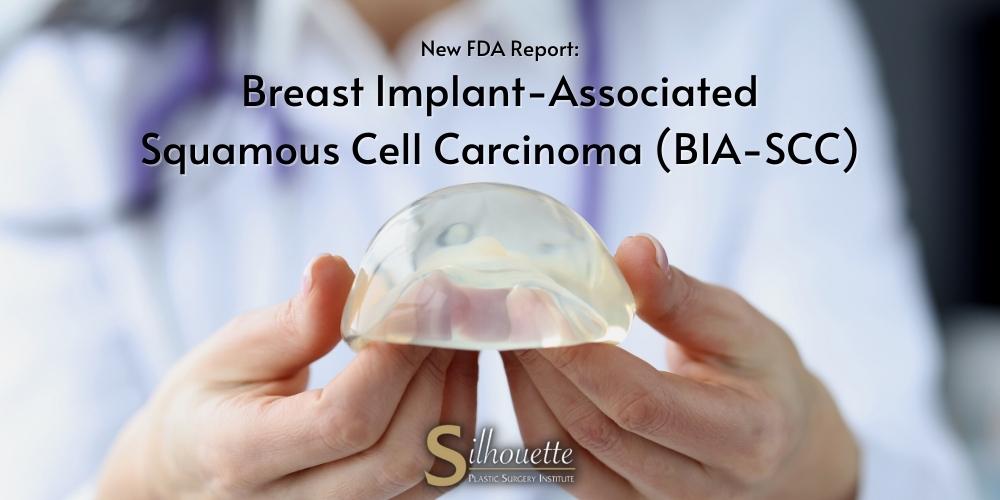Just like any other medical device, breast implants definitely come with their own set of risks and complications. Several years ago, the FDA announced that a rare type of cancer – anaplastic large cell lymphoma – can be associated with breast implants. Over the last several months, the FDA has linked yet another type of cancer to breast implants: squamous cell carcinoma.
Breast implant-associated squamous cell carcinoma (BIA-SCC) and breast implant-associated anaplastic large cell lymphoma (BIA-ALCL) are not breast cancers. Squamous cell carcinomas are common types of skin cancers, which can be aggressive without quick diagnosis and treatment. Meanwhile, anaplastic large cell lymphoma is a rare type of non-Hodgkin lymphoma. Neither cancer has anything to do with the breast tissue cells. Instead, these cancers are found within the breast implant capsule.
The latest FDA update states that BIA-SCC is a generally aggressive disease with poor prognosis if not diagnosed and treated immediately. The latest case reports indicate that squamous cell carcinoma of the breast successfully treated by complete breast implant removal. Failure to completely remove all of the breast capsule (along with the implant, of course) can result in recurrent metastases of BIA-SCC, which is why both patients and plastic surgeons should take this disease very seriously. Below, we explain the details of the latest FDA update on BIA-SCC.
If you are suffering from BIA-SCC, BIA-ALCL, breast implant illness (BII), or any other breast implant-related complications, you may be a good candidate for breast implant removal. Additionally, if you’re considering getting breast implants, it’s crucial to speak to board-certified plastic surgeon Dr. Daneshmand about the risks and benefits. Call 949-359-8397 to schedule an appointment at Silhouette Plastic Surgery Institute today.
What is Breast Implant-Associated Squamous Cell Carcinoma (BIA-SCC)?
Firstly, let’s break down what squamous cell carcinoma is. Squamous cell carcinoma is the second most common type of skin cancer following the most common type: basal cell carcinoma.
SCC begins in the squamous cells in the epidermis, which is the outermost layer of skin. SCC most commonly develops on areas of the skin that get the most sun exposure, like the face, head, arms, and legs. If the cancer is only found on your skin, then it’s considered cutaneous squamous cell carcinoma. But if the cancer is found on your skin as well as within other parts of your body, then it’s considered metastatic squamous cell carcinoma.
There is also squamous cell metaplasia (AKA squamous metaplasia) which is characterized by non cancerous changes of the squamous cells within the tissue that lines the glands and organs. This tissue is called the epithelium. These benign cells can turn into malignant cells over time. In other words, these noncancerous cells can turn cancerous.
Now – what is breast implant-associated squamous cell carcinoma (BIA-SCC)? Breast squamous cell carcinoma is a rare type of cancer that forms around the breast implant capsule. It’s important to note that while this type of cancer is found within the breasts, it’s not considered breast cancer. Breast cancer occurs when the breast tissue cells grow rapidly and abnormally. BIA-SCC has nothing to do with the breast tissue cells, and everything to do with abnormal cell growth within the scar tissue capsule surrounding the breast implant.
Cases of BIA-SCC According to the Latest FDA Update
On March 8, 2023, the FDA released an update about BIA-SCC. Several months prior, in September 2022, the FDA released a report about various breast-implant related cancers, including BIA-SCC. Now, the FDA is updating the public on its review of literature and medical device reports (MDRs) associated with breast implant-associated squamous cell carcinoma.
The FDA reports that primary squamous cell carcinoma of the breast implant capsule is still very rare, however, they now know of 19 cases of the disease in published literature. They also know of a few deaths from this disease.
Of the 19 cases of primary pure squamous cell carcinoma of the breast, 17 were reported among women while 1 was reported among a man. 3 cases resulted in death. The ages of these patients ranged from 40 to 81 years old. The time of diagnosis ranged from 7 to 42 years after these patients received their breast implants. Doctors found the breast implant-associated squamous cell carcinoma in the scar tissue surrounding the implant, as well as behind the implant. The cancer was not found in the actual breast tissue.
47% of the 19 cases of BIA-SCC involved silicone implants, 37% involved saline, and 16% involved an unspecified type of implant.
Symptoms of Breast Implant-Associated Squamous Cell Carcinoma (BIA-SCC)
According to the FDA update, the most common symptoms associated with primary squamous cell carcinoma of the breast implants include:
- Breast swelling
- Breast pain or tenderness
- Redness or skin discoloration on the breasts
- Breast tumors or lumps
Without quick diagnosis and treatment, BIA-SCC can spread to other parts of the body such as the lymph nodes, muscles, or even bones. Lymph node metastasis (AKA: lymph node involvement) is often marked by chronic inflammation of the lymph nodes.
Distant metastasis of this type of cancer is very dangerous and aggressive, and comes with a higher mortality rate. In fact, the current mortality rate for BIA-SCC is nearly 44% at 6 months. That’s why it’s so important to see a doctor as soon as possible after you notice any of the aforementioned symptoms.

What is Breast Implant-Associated Anaplastic Large Cell Lymphoma (BIA-ALCL)?
Breast implant-associated anaplastic large cell lymphoma (BIA-ALCL) is also a very rare type of cancer that forms around the breast implant capsule. BIA-ALCL is not breast cancer. Instead, it’s a type of non-Hodgkin’s lymphoma which affects the immune system. BIA-ALCL also has the potential for distant metastasis, which means that it can spread to the lymph nodes and other organs.
As of March 2023, there are approximately 411 cases (both confirmed and suspected) of BIA-ALCL in the United States and 1,400 cases across the globe.
Symptoms of Breast Implant-Associated Anaplastic Large Cell Lymphoma (BIA-ALCL)
Common symptoms associated with breast implant-associated anaplastic large cell lymphoma (BIA-ALCL) include:
- Breast swelling
- Breast pain or tenderness
- A noticeable lump in the breast area
- Fluid accumulation (seroma) in the breast
If you have breast implants and you notice any of the aforementioned symptoms, it’s important to see a doctor as soon as possible. This type of cancer has a much lower mortality rate (nearly 3% at one year), but still, it should be taken very seriously because it can spread to other parts of the body.
Treatment for Breast Implant-Associated Squamous Cell Carcinoma (BIA-SCC)
The best way to diagnose breast implant associated squamous cell carcinoma is through an ultrasound, an MRI, and/or a PET-CT scan.
The best course of treatment for BIA-SCC thus far – based on limited data and research – is breast surgery in order to remove the implants and the scar tissue capsule. If the surgeon fails to completely remove the implants and/or the scar tissue capsules, the cancer can come back in a very extreme form.
If the patient is experiencing lymphatic spread of BIA-SCC (or any other form of distant metastasis), adjuvant chemotherapy and/or radiation therapy may be recommended. However, there is minimal evidence to support the effectiveness of adjuvant therapy for BIA-SCC at this time.
FDA Recommendations for Those With Breast Implants or Those Considering Breast Implants
While breast implants certainly come with small risks of cancer and other complications, they are still considered safe medical devices. If you currently have breast implants or you’re considering breast augmentation surgery, be sure to do the following:
- Speak with an experienced, board-certified plastic surgeon – such as Dr. Daneshmand – about the risks and benefits of breast implants.
- If you have breast implants, keep following your individualized medical care or follow-up appointments.
- Regularly monitor yourself for the BIA-SCC or BIA-ALCL symptoms listed above.
- If you notice any lumps, swelling, redness, or pain, see a doctor immediately.
- If a doctor diagnoses you with BIA-SCC, it’s best to undergo breast implant removal surgery as soon as possible.
- You do not have to get your breast implants removed if you don’t have any symptoms of cancer or other complications.
- If you notice any problems stemming from your breast implants, file a report to the FDA through MedWatch. Reports about breast implants can help the FDA keep other patients safe and healthy.

Call Silhouette Plastic Surgery Institute Today
If you’re suffering from BIA-SCC, BIA-ALCL, breast implant illness (BII), or any other complications associated with your breast implants, you may be a good candidate for breast implant removal. Dr. Daneshmand is a board-certified plastic surgeon with more than 30 years of experience in helping his patients achieve optimal beauty, confidence, and wellbeing. He is well-informed about the risks and benefits of breast implants. He can help you decide if you’re a good candidate for any type of breast surgery, whether that be breast augmentation or breast implant removal. Call 949-359-8397 to schedule an appointment at Silhouette Plastic Surgery Institute today.

